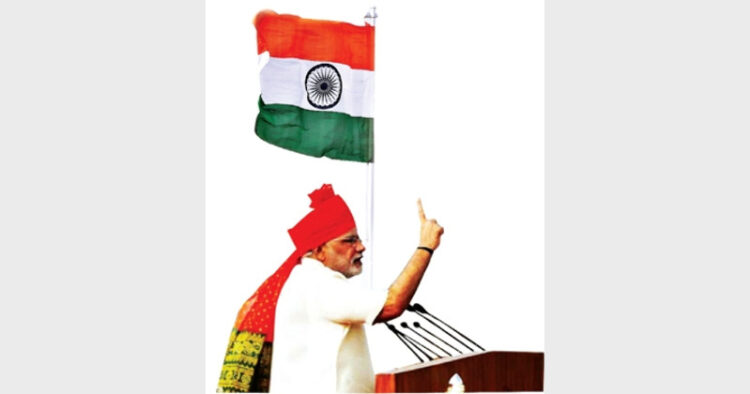Unpredictability has become a strength of the ‘Moditva’ phenomenon and also for the BJP as a big political party.
No journalistic genius and political pundit could predict that a first-timer such as Bhupendra Patel could become Chief Minister of India’s ‘show case’ state Gujarat. In Nagaland, the BJP tried a revolution by nominating S Phangnon Konyak – a woman – to Rajya Sabha.
So far, the Christian state has had only one female MP in the 1970s and no woman legislator in the state assembly since statehood in 1963.
All speculation about the Modi-Yogi rift has come to a cropper. And notwithstanding Pegasus row or other campaigns about human rights excesses and so on, the people of India still stand with the man who delivered the Ram temple and abolished Article 370 in Kashmir.
On the foreign policy front, as articulated by External Affairs Minister Dr S Jaishankar “Yes, the Indian Foreign Service has changed. Yes, they follow the orders of the Government. Yes, they counter the arguments of others. No, it’s not called Arrogance. It is called Confidence….And it is called defending the National Interest”.
In 2014 if one was asked – Why did India succumb to Modi mania?
The response would have been: “Now, that’s the real question. It’s the hunger for change. Modi and BJP played ‘dream merchants’ at a time when people’s mood was down-slide and everyone, even in villages, was feeling demoralized. Modi represented different aspirations to different sets of people and perhaps that’s the yardstick of a mass appeal of a leader”.
This has remained a constant factor in Indian polity during the last eight years. While Moditva as a phenomenon is still being associated with generation next and aspirational Indian youths, the opposition Congress party has turned to be an image of old – something stale and outdated.
The age gap between older Modi and younger Rahul Gandhi is also not helping the Congress cause.
This is the major drawback with the principal opposition party in India and also some other parties who largely ape the good old Congress style.
Look at the likes of Sharad Pawar-led NCP or Mamata Banerjee’s Trinamool Congress.
In substance, one would not find much of a difference between them and the Congress party.
Other regional parties also have some of this inherent baggage of Congress culture. The ‘dynasties’ still do not just survive in parties such as TDP and Samajwadi Party – they have thrived and those outside the top family do not have any chance!
Like Modi, Mamata Banerjee is a single spinster. But unlike Modi and like Congress leaders – she too has groomed a nephew – ambitious and at times aloof from the real polity.
Major political parties in India or elsewhere most often are forced to battle contradictions within themselves.
This is no exception to Indian parties too. The communists and chiefly the Marxists did not quite try to revisit the traditional ‘disconnect’ between globalisation and reality. The results are reflected in the mandate of West Bengal and Tripura.
The survival instinct helped in Kerala but that too due to a major fault line in the Congress.
Hence, the Moditva thrives.
On the administrative front, India has changed in more ways than one. No serious corruption charge could be made against the Modi regime.
Congress leader Rahul Gandhi’s allegation of such charges vis-a-vis the purchase of Rafale aircraft has been rejected both by the Supreme Court and also the people of India. Rather the campaign line – ‘Chowkidar chor hae’ had backfired and perhaps drawn sympathy for Prime Minister Modi.
Instead, expectations are nevertheless built around the man called Narendra Modi. The word ‘gatekeeper’ or Chowkidar has stuck to Modi vis-a-vis his delivery on national security issues and projecting India’s image abroad.
Modi remains a leader of the people, importantly the defender of Hindu values. Even other BJP chief ministers emulate him and have remained firm about their commitment to Hindutva and nationalism.
A large number of people in states like Assam and Gujarat say the Congress and especially the leadership provided by Nehru and his successors represented a different notion of patriotism.
The fact of the matter is people believe the Congress even during pre-Independence say, the Congress was too close to the British colonizers.
People in Nagaland in 2022 also clamour with their version of ‘hunger for change’; they want a Solution to 27-year-old Naga peace talks.
If one believes Naga veteran politician S C Jamir, the Prime Minister has “guts” and it is essential to deal with the Naga peace talks.



















Comments